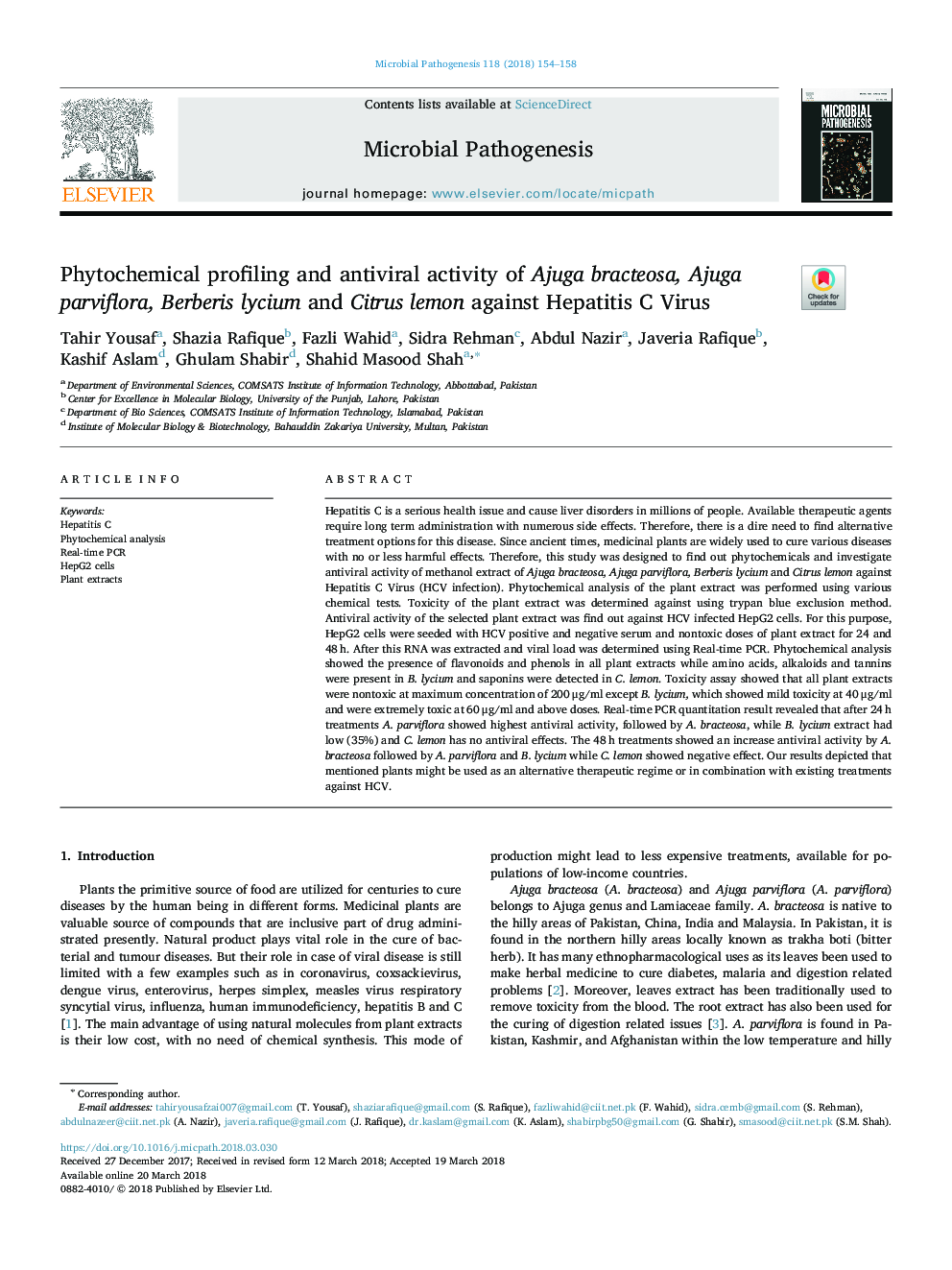| کد مقاله | کد نشریه | سال انتشار | مقاله انگلیسی | نسخه تمام متن |
|---|---|---|---|---|
| 8749546 | 1593671 | 2018 | 5 صفحه PDF | دانلود رایگان |
عنوان انگلیسی مقاله ISI
Phytochemical profiling and antiviral activity of Ajuga bracteosa, Ajuga parviflora, Berberis lycium and Citrus lemon against Hepatitis C Virus
دانلود مقاله + سفارش ترجمه
دانلود مقاله ISI انگلیسی
رایگان برای ایرانیان
کلمات کلیدی
موضوعات مرتبط
علوم زیستی و بیوفناوری
ایمنی شناسی و میکروب شناسی
میکروب شناسی
پیش نمایش صفحه اول مقاله

چکیده انگلیسی
Hepatitis C is a serious health issue and cause liver disorders in millions of people. Available therapeutic agents require long term administration with numerous side effects. Therefore, there is a dire need to find alternative treatment options for this disease. Since ancient times, medicinal plants are widely used to cure various diseases with no or less harmful effects. Therefore, this study was designed to find out phytochemicals and investigate antiviral activity of methanol extract of Ajuga bracteosa, Ajuga parviflora, Berberis lycium and Citrus lemon against Hepatitis C Virus (HCV infection). Phytochemical analysis of the plant extract was performed using various chemical tests. Toxicity of the plant extract was determined against using trypan blue exclusion method. Antiviral activity of the selected plant extract was find out against HCV infected HepG2 cells. For this purpose, HepG2 cells were seeded with HCV positive and negative serum and nontoxic doses of plant extract for 24 and 48â¯h. After this RNA was extracted and viral load was determined using Real-time PCR. Phytochemical analysis showed the presence of flavonoids and phenols in all plant extracts while amino acids, alkaloids and tannins were present in B. lycium and saponins were detected in C. lemon. Toxicity assay showed that all plant extracts were nontoxic at maximum concentration of 200â¯Î¼g/ml except B. lycium, which showed mild toxicity at 40â¯Î¼g/ml and were extremely toxic at 60â¯Î¼g/ml and above doses. Real-time PCR quantitation result revealed that after 24â¯h treatments A. parviflora showed highest antiviral activity, followed by A. bracteosa, while B. lycium extract had low (35%) and C. lemon has no antiviral effects. The 48â¯h treatments showed an increase antiviral activity by A. bracteosa followed by A. parviflora and B. lycium while C. lemon showed negative effect. Our results depicted that mentioned plants might be used as an alternative therapeutic regime or in combination with existing treatments against HCV.
ناشر
Database: Elsevier - ScienceDirect (ساینس دایرکت)
Journal: Microbial Pathogenesis - Volume 118, May 2018, Pages 154-158
Journal: Microbial Pathogenesis - Volume 118, May 2018, Pages 154-158
نویسندگان
Tahir Yousaf, Shazia Rafique, Fazli Wahid, Sidra Rehman, Abdul Nazir, Javeria Rafique, Kashif Aslam, Ghulam Shabir, Shahid Masood Shah,